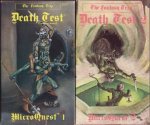Fauchard1520
Adventurer
"Do you walk through the mysterious archway?"
"Do you drink the potion?"
"Do you push the big red button?"
If you're an old-school D&D player, you've probably got the necklace of strangulation and The Tomb of Horrors in the back of your mind. As such, the answer to all of the above is no doubt "hell no." My question is whether we, as GMs, should try to encourage daredevil behavior. Should gambling on a hunch and "unwary play" ever be rewarded? In other words, what kind of behavior do we really want to see at the table? "I drink the potion, what happens?" or the cautions "Dread Gazebo" approach (e.g. "I detect good... I call out to it... I shoot it with my bow.")? And if the answer is "mix it up," what's the right percentage? Should random chance scenarios be 50% harm / 50% help, or something else?
Comic for illustrative purposes.
"Do you drink the potion?"
"Do you push the big red button?"
If you're an old-school D&D player, you've probably got the necklace of strangulation and The Tomb of Horrors in the back of your mind. As such, the answer to all of the above is no doubt "hell no." My question is whether we, as GMs, should try to encourage daredevil behavior. Should gambling on a hunch and "unwary play" ever be rewarded? In other words, what kind of behavior do we really want to see at the table? "I drink the potion, what happens?" or the cautions "Dread Gazebo" approach (e.g. "I detect good... I call out to it... I shoot it with my bow.")? And if the answer is "mix it up," what's the right percentage? Should random chance scenarios be 50% harm / 50% help, or something else?
Comic for illustrative purposes.










